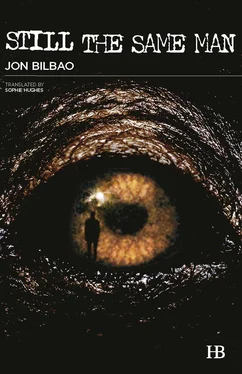“Hans Hörbiger was born in Austria in the middle of the nineteenth century. He studied engineering and specialized in steam-powered machinery and compressors. He invented an incredibly low-friction valve, patented it, and before he knew it was a millionaire. He created a company to commercialize his invention and left it in the hands of his son. From that day on, he dedicated himself wholly to scientific investigation .”
“Our friend Hörbiger had two passions. The first was astronomy, and the second, as it is for most experts in steam-powered machinery, the transformation of water into its various states. From his telescopic observations, he had begun to suspect that the reflections he saw on the Moon were produced by great masses of ice, which in turn led him to think that the entire satellite was formed of this substance. What’s more, he believed that the same was true of other celestial bodies. Most likely he had this idea in mind when, one winter’s day, on a visit to a steelworks, he noticed how a quantity of molten steel spilled over the frozen ground. The earth sizzled and spat and cracked open under the burning steel and produced violent explosions of steam. Hörbiger had an epiphany.”
“The entire universe had to be the result of a encounter between ice and fire. Hörbiger imagined the origin of the universe as a collision between an enormous, incandescent mass — a super sun — and another mass of immense proportions, in this case made of ice. The meeting of these two bodies provoked a colossal explosion that broke both into pieces, which were then scattered throughout space. Out of this came fragments made solely of ice, like the Moon, others made solely of fire, like the Sun, and others, like Earth, made out of a combination of the two. Are you still with me?”
Joanes nodded a yes.
“Next, Hörbiger concluded his cosmogony by applying to it the Law of Universal Gravitation, or an adapted version of it. According to him, astral bodies did not adhere to fixed orbits around the larger bodies, as the Moon does around us. He believed that forces of attraction possessed a greater power than repulsive forces. As a result, a satellite, like the Moon, would not trace an elliptical orbit around its planet but rather a slow spiral that would gradually draw it toward the planet. At the end of this spiral, the two bodies would collide in a new cataclysm of fire and ice. According to Hörbiger, this will have happened various times since the beginning of the universe. Our Moon must be the fourth to have circled us since the beginning of time. Three others would have preceded it, each with their own resulting cataclysm.”
The professor paused for a moment and cleared his throat before going on.
“Up to this point, Hörbiger’s theory, however erroneous, is based on scientific principles and would merit at least some consideration. But notes of fantasy-science gradually begin to creep in. The Moon’s approach toward the Earth, he suggested, must be very slow, which means there must also be a lengthy period — of several thousands of years — in which the two bodies find themselves in very close proximity. In this interval, the combined gravitational pulls of the satellite and the planet would have certain effects on the Earth’s inhabitants, primarily on their size. In other words, it would have been an age of giants. The Earth would have been populated by plants, animals, and human beings, all giant.”
“These giants wouldn’t have been entirely wiped from the Earth during the final collision. Some of them, the fittest, the super-giants, would have survived, and from there life on Earth would have regenerated. As you can see, a load of baloney.”
“But this boloney fell on fertile ground; ground peopled by goosestep aficionados and Wagner-loving opera-goers. Hörbiger’s cosmology fitted the burgeoning national socialist mythology like a glove. All those tales of giants, cataclysms, frozen landscapes, and biologically privileged survivors resounded perfectly with the Nordic mythology so admired by the Führer. Hitler adopted Hörbiger’s hypotheses as his own. As such, the deliriums of a madman who should never have left his valve workshop ended up turning into doctrine.”
“But we’re talking about the 1930s,” interrupted Joanes, “not the Middle Ages. Those deliriums would have met with staunch opposition.”
The professor threw him a pitying smile.
“Hörbiger considered objective science to be a kind of totem in decline. He also claimed that man’s preoccupation with coherence is a deadly vice. And Hitler thought the same. What’s more, as well you know, the Nazis’ methods for silencing their opposition were as effective as they were uncivilized.”
“I don’t see the relevance of this to your argument,” said Joanes. “The dramatic or truly problematic element of this story isn’t that a mystic or religious doctrine was extrapolated from a scientific discovery, but the fact that this doctrine was espoused by another, larger one for exclusively utilitarian motives. The Nazis appropriated Hörbiger’s cosmogony not because they really believed in it, but because it suited their interests. The truly despicable thing is to carry an ideology, in this case National Socialism, to such twisted extremes.”
“I’m not sure that the Nazis didn’t believe in The World Ice Doctrine,” the professor responded, “although it’s possible that you know more on this matter than I do. In any case, what really matters here is that his cosmogony was accepted thanks in great part to its scientific foundations, which lent it credibility. Worse still, they converted it into something applicable to the real world. Hitler believed that by simply adhering to The World Ice Doctrine, ice would obey him, as if by uncovering the secrets of ice’s origin and behavior, the Führer could become its master. When he launched his winter campaign against Russia during the Second World War, Hitler spoke of how the cold was going to obey him like one of his generals. Of course, you’re well aware of what really happened. Temperatures dropped to as low as forty below, liquid syngas disassociated, and vehicles stopped working, soldiers would bend down to defecate, and their asses would turn into ice donuts. Until one of Hitler’s generals dared to ask him to reconsider the Russian assault. Do you know what his response was?”
Joanes did know, and hastened to answer.
“‘Leave winter to me. You, attack.’”
“That’s right. That was more or less Hitler’s answer. And he meant it literally; he believed he could control the cold.”
Joanes was still at a loss as to the relevance of the story. The reference to Nazism, what’s more, seemed to him an extreme measure. To his mind, anyone who resorted to those kinds of references, even to berate them, was employing the kind of radical, devastating argument that was all too reminiscent of the National Socialists themselves. There was something premeditated, too, about the professor’s argument, a hunch that only fueled Joanes’s general suspicion. His whole cosmogony spiel seemed pre-rehearsed, as indicated by the — albeit shoddy — alliteration of a phrase like “the earth sizzled and spat and cracked open,” and his way of introducing the Nazis as “Wagner-loving opera-goers.”
Joanes imagined the professor in his study or his office or wherever it was he worked, researching and putting his speech together, reading it aloud, adjusting the story to the lesson he wanted to communicate through it. It was clear the professor had not been irritated by the interruption to his conference. Quite the contrary. He’d delighted in the opportunity to share the story with an audience, and he was so self-satisfied that now he was treating Joanes to another round.
“And there’s an even more serious problem,” the professor was saying. “And this is precisely what I tried to make that gentleman at the conference understand when he began speculating over whether a new religion could arise out of Artificial Intelligence. If something like that happened, as was the case with Hörbiger, we’d find ourselves with a case of regression. A scientific advance, a rational advance, a logical advance would make us move backward of our own free will to a state of pre-logical thinking.”
Читать дальше












